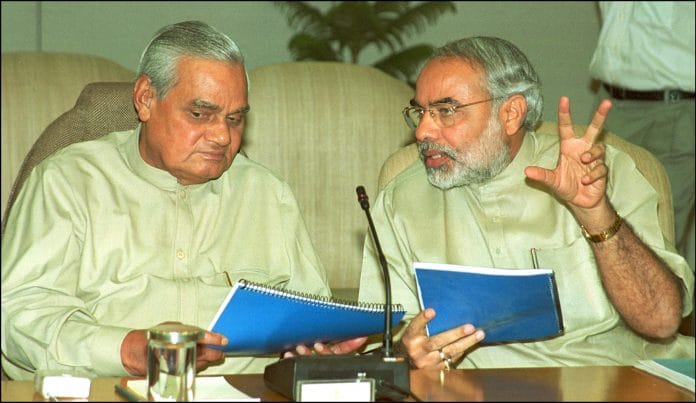In his book ‘A Call to Honour’, former external affairs minister Jaswant Singh wrote that the May 2002 suicide terrorist attack in Kaluchak in the Jammu region, in which 30 people, including civilians were killed, “was the last straw” that almost brought India and Pakistan to war.
Only six months before, on December 13, 2001, terrorists had attacked Parliament, which led then prime minister Atal Bihari Vajpayee to launch ‘Operation Parakram,’ when several divisions of the army moved to the Pakistan border.
Seventeen years later, on 14 February 2019, a terrorist attack by the Jaish-e-Mohammed has killed at least 37 CRPF jawans, and Prime Minister Narendra Modi has promised a “munh tod jawab (smash your face response)”.
The PM’s strong words in two public meetings the day after the attack in Pulwama, when he flagged off the Vande Bharat Express in New Delhi and then flew to Jhansi in Uttar Pradesh to inaugurate several projects worth Rs 20,000 crores, have escaped no one.
Also read: Modi must restore BJP to what it was in Vajpayee-Advani times: Yashwant Sinha
Although he cancelled his Friday’s political rally in Madhya Pradesh’s Itarsi as well as two others scheduled for Saturday (in Pandharkawada and Dhule), Modi did speak his mind fully in Delhi and in Jhansi:
— Security forces have been given the full freedom to decide how to respond to this dastardly attack, at a time and place of their choosing.
— Our neighbouring country is forgetting that this India is a new country (“nayi reeti and nayi neeti vaala Bharat”). Those who carried out this attack will be punished.
— Our neighbouring country finds it difficult to carry out their daily expenditure. They are roaming around the world with a begging bowl. By attacking us in Pulwama, they want to reduce us as well to this position. But we will not let this happen, we will smash their face with our response.
Modi has not left it to anybody’s imagination as to what is being contemplated. There is expected to be retaliation against Pakistan, at a time and place of India’s choosing.
Compare Modi’s remarks with those of the previous BJP prime minister Vajpayee’s.
Also read: The BJP wants its own Jawaharlal Nehru, and Vajpayee the poet-statesman may be the answer
In 2002, Vajpayee told Parliament, “Hamein pratikar karna hoga (we will have to retaliate).” On the whole, though, public rhetoric was kept low – unlike Modi, who twice in a day, has signalled his intention to punish Pakistan. Vajpayee had threatened to go to war against Pakistan, telling the Americans privately that he would do so if Pervez Musharraf was not called to heel.
It is worth recalling that Vajpayee’s reaction to Kaluchak came in the backdrop of his experience of the 1999 Kargil conflict – which he had skilfully managed by getting then US president Bill Clinton to ask Pakistani forces to withdraw to the Line of Control – as well as the failed talks in Agra in 2001.
The Americans, nervous that two nuclear neighbours would reach a flashpoint, pressed all their Western allies and Japan to take action. All diplomats and families in all the embassies and consulates in both India and Pakistan were withdrawn. Vajpayee wrote to the heads of government of all five permanent member countries that Musharraf had failed to live up to his promises to end cross-border infiltration.
But as Modi points out today, he is made of sterner stuff and India of 2019 is “a different country”. Over the next few days, Modi will lead from the front, unlike Vajpayee who left much of the backroom follow-up to his colleagues, whether it’s then external affairs minister Jaswant Singh, then finance minister Yashwant Sinha or then National Security Advisor Brajesh Mishra.
The ministry of external affairs has already launched its diplomatic campaign to put global pressure on Pakistan. On February 17, the Financial Action Task Force (FATF) will begin a five-day meets in Paris to assess, in its first review, whether Pakistan has done enough to end terror financing.
Writing in the ‘New Yorker,’ journalist Steve Coll had noted that in 2002, after Kaluchak attack, Brajesh Mishra had told him that “We almost went in,” indicating that India had planned to invade Pakistan. “(B)ut Prime Minister Vajpayee, when he faced the final step, concluded that, at the end of a long political career, he wanted to be remembered as a man of peace,” Coll wrote.
Sure enough, a year later, Vajpayee travelled to Srinagar in the spring of 2013 and extended a hand for talks and friendship with its people.
Will Modi follow in Vajpayee’s footsteps? When the history pages are written, will Modi be remembered as a man of peace or war?







Instead of Getting Indians Killed on a daily basis , it is better to go to war. With our soldiers being attacked on a daily basis it is HIGH TIME INDIANS ACCEPT THAT WE ARE ANYWAYS IN WAR WITH PAKISTAN.
Shashank Joshi – military correspondent of The Economist – has tweeted how little traction this incident is gaining in the rest of the world. Despite being the worst terrorist strike – barring Maoist violence – since 26 / 11, the worst incident in Kashmir in decades, being traced back to Pakistan based JeM. The whole world, including the UN Secretary General, has urged the two nation’s to talk, offered good offices, if acceptable. Not sure how far we have succeeded in “ isolating “ Pakistan. 2. We almost went in sounds like a grandfather regaling his family over an after dinner cognac and cigar. Not the real world, for two, tetchy nuclear armed adversaries that have so much of bad blood – a lot of it spilt – between them.
In the second last para it should be 2003 not 2013